More Excellent Software Engineering Books!
If you liked AntiPatterns, here's some more books you'll probably want! Find out
more about each book or order it directly from amazon.com
by clicking on the cover image.
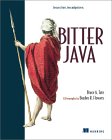 |
Bitter Java
(Manning Publications Company)
by Bruce A. Tate
Bruce Tate has, with Bitter Java, created another of the rare
captivating works in the software field. I couldn't put it down. As with DeMarco's
Morovian kidnapping, Bruce's personal "extreme sports"
kyaking, mountain biking,and hot-air balloning adventures carried me from
"hydraulic" point to point, paddling as fast as I could to get
to the next pattern or point. As with Guy Steele, I
couldn't wait for the next successive insight; and as with DeMarco,
I just couldn't put Bitter Java down. (Learn more at
http://www.bitterjava.com) |
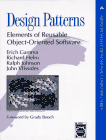 |
Design Patterns : Elements of Reusable Object-Oriented
Software
(Addison-Wesley Professional Computing)
by Erich Gamma, Richard Helm, Ralph Johnson, John Vlissides
This book is the "bible" of pattern research. The authors, known as the
"Gang of Four," are undoubtedly four of the most prominent pattern researchers
alive today. Design Patterns : Elements of Reusable Object-Oriented Software
offers a great discourse of the world of patterns, what they are, and why they are so
useful. this book's 23 patterns serve as a foundation for the understanding of patterns |
|

|
Libra : Learning and Inquiry-Based Reuse Adoption
(IEEE press)
by Sidney C. Bailin, Mark A. Simos, Larry Levine, Richard Creps
"I strongly believe that the real killer risks lie
in the human domain. In fact, this is what the Libra methodology is all
about - see the book I and 3 others published last year about this (it has
good cartoons, which pretty much tell the story, so even if you're not up
to reading it...)." -Dr. Sidney Bailin
This book presents an inquiry-based approach to software reuse and
adoption that suggests practical techniques for assessing an
organization's readiness for reuse, as well as potential barriers. The
techniques integrate reuse concepts with a diverse set of other
disciplines, including organizational learning, dramatic theory, and
belief mapping to affirm the role of culture and attitude in engineering
success. |
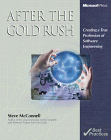 |
After the Gold Rush : Creating a True
Profession of Software Engineering (Best Practices)
(Microsoft Press)
by Steve McConnell
Received the prestigious Software Development Productivity award -- one
of 24 award recipients from a record field of more than 350 nominees.
After the Gold Rush examines the state of the industry and the critical
developments already in motion that are shaping the future of professional
software development. |
|

|
Software Architecture:
Organizational Principles and Patterns
(Prentice Hall)
by David M. Dikel, David Kane, James R. Wilson
Although the book is about software architecture, not AntiPatterns per
se, it contains 17 AntiPatterns. The book also provides a mapping between
the concepts in the book and the AntiPatterns that appear our first book.
If you are interested, please click on the book cover (to buy it at
Amazon) or check out their
site (www.vraps.com). |
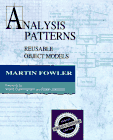 |
Analysis Patterns : Reusable Object Models
(Addison-Wesley Object Technology: Addison-Wesley Object Technology Series)
by Martin Fowler
Fowler's Analysis Patterns documents a collection of very detailed patterns
focussed on the healthcare, banking, and financial genres. A very interesting read
indeed. |
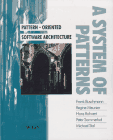 |
Pattern Oriented Software Architecture : A System of
Patterns
(John Wiley & Sons)
by Frank Buschmann, Regine Meunier, Hans Rohnert, Peter Sommerlad, Michael Stal
Known as the "Gang of Five," this team of authors gives us a bigger-scope
perspective on the potential of patterns for software engineering. Addressing
patterns from the level of the idioms used in specific computer languages to design
patterns and higher level patterns, this is a must read for those responsible for software
engineering professionals. |
 |
The Pattern Almanac 2000
(Addison-Wesley Software Patterns Series)
by Linda Rising
This book provides a fairly comprehensive shopping list of patterns.
There's not a lot of specific content, but this a catalog of patterns can
help you find the patterns you are looking for. |
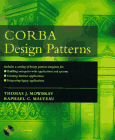 |
CORBA Design Patterns
(John Wiley & Sons)
by Thomas J. Mowbray, Raphael C. Malveau
A book/CD-ROM guide to constructing distributed applications based on
CORBA, providing design patterns and examples for designing OMG IDL
interfaces and explaining how to integrate legacy and Internet applications. |
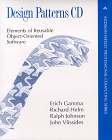 |
Design Patterns CD : Elements of Reusable Object-Oriented
Software
(Addison-Wesley Pub Co)
by Erich Gamma, Richard Helm, Ralph Johnson, John Vlissides |
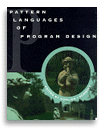 |
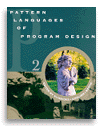 |
 |
Pattern Languages of Program Design
by James O. Coplien, Douglas C. Schmidt (Editor), Jim Coplien, Doug Schmidt
Pattern Languages of Program Design 2
by John M. Vlissides (Contributor), James O. Coplien (Editor), Norman L. Kerth, James]
Coplien
Pattern Languages of Program Design 3 (Software Patterns Series)
by Robert C. Martin (Editor), Dirk Riehle (Editor), Frank Buschmann (Editor) |
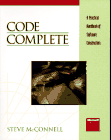
|
Code Complete : A Practical Handbook of
Software Construction
(Microsoft Press)
by Steve McConnell The McConnell books are some of the most
useful software engineering management books ever published. If you
haven't read them, you are missing out on a great deal of expertise and
wisdom. Won the Software Development Jolt award for best
programming book of the year: in 1994. |
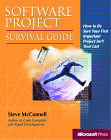
|
Software Project Survival Guide
(Microsoft Press)
by Steve McConnell
Won the Software Development Jolt award for best programming
book of the year: in 1997. |
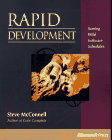
|
Rapid Development : Taming Wild Software
Schedules
(Microsoft Press)
by Steve McConnell |

|
The Deadline : A Novel About Project
Management
(Dorset House)
by Tom Demarco
This is one of my most favorite books. |
 |
Common LISP: The Language
(Digital Press)
by Guy L. Steele, Jr. This is the best software book ever
published. It should be read while comfortably sunbathing on a tropical
beach. Wear lots of sunscreen. |

|
Death March : The Complete Software
Developer's Guide to Surviving 'Mission Impossible' Projects (Yourdon Computing Series)
(Prentice Hall Computer Books)
by Edward Yourdon, Paul D. Becker (Editor) |
|